| Listing 1 - 10 of 13 | << page >> |
Sort by
|
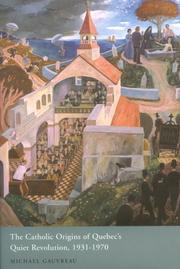
ISBN: 128286341X 9786612863417 0773572759 9780773572751 0773528741 9780773528741 9780773533714 0773533710 Year: 2005 Publisher: Montreal : McGill-Queen's University Press,
Abstract | Keywords | Export | Availability | Bookmark
 Loading...
Loading...Choose an application
- Reference Manager
- EndNote
- RefWorks (Direct export to RefWorks)
The Catholic Origins of Quebec's Quiet Revolution challenges a version of history central to modern Quebec's understanding of itself: that the Quiet Revolution began in the 1960s as a secular vision of state and society which rapidly displaced an obsolete, clericalized Catholicism. Michael Gauvreau argues that organizations such as Catholic youth movements played a central role in formulating the Catholic ideology underlying the Quiet Revolution and that ordinary Quebecers experienced the Quiet Revolution primarily through a series of transformations in the expression of their Catholic identity. Providing a new understanding of Catholicism's place in twentieth-century Quebec, Gauvreau reveals that Catholicism was not only increasingly dominated by the priorities of laypeople but was also the central force in Quebec's cultural transformation. He makes it clear that from the 1930s to the 1960s the Church espoused a particularly radical understanding of modernity, especially in the areas of youth, gender identities, marriage, and family.
Catholic youth --- Catholic action --- Youth movement --- Social change --- Change, Social --- Cultural change --- Cultural transformation --- Societal change --- Socio-cultural change --- Social history --- Social evolution --- Christian youth --- Social movements --- Action, Catholic --- Apostolate, Lay --- Lay apostolate --- Social justice --- History --- Religious aspects --- Catholic Church --- Catholic Action --- Youth movements --- Church of Rome --- Roman Catholic Church --- Katholische Kirche --- Katolyt︠s︡ʹka t︠s︡erkva --- Römisch-Katholische Kirche --- Römische Kirche --- Ecclesia Catholica --- Eglise catholique --- Eglise catholique-romaine --- Katolicheskai︠a︡ t︠s︡erkovʹ --- Chiesa cattolica --- Iglesia Católica --- Kościół Katolicki --- Katolicki Kościół --- Kościół Rzymskokatolicki --- Nihon Katorikku Kyōkai --- Katholikē Ekklēsia --- Gereja Katolik --- Kenesiyah ha-Ḳatolit --- Kanisa Katoliki --- כנסיה הקתולית --- כנסייה הקתולית --- 가톨릭교 --- 천주교 --- Québec (Province) --- Histoire --- Kempek (Province) --- Canada East --- Province de Québec --- Province of Québec --- Provinsie van Quebec --- Kvebek (Province) --- Правінцыя Квебек --- Pravintsyi︠a︡ Kvebek --- Квебек (Province) --- Κεμπέκ (Province) --- Kebekio (Province) --- Kebek (Province) --- 퀘벡 주 --- Kʻwebek-ju --- Kʻwebek (Province) --- Kupaik (Province) --- קוויבק (Province) --- Ḳṿibeḳ (Province) --- Quebecum (Province) --- Kvebeka (Province) --- Kvebekas (Province) --- Kébeki (Province) --- Кэбэк (Province) --- ケベック州 --- Kebekku-shū --- Kebekkushū --- ケベック (Province) --- Kebekku (Province) --- Provincia Québec --- קוויבעק (Province) --- Kvebeks (Province) --- 魁北克 (Province) --- Kuibeike (Province) --- Kui bei ke (Province) --- Lower Canada
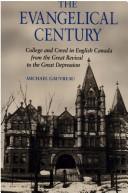
ISBN: 1282851705 9786612851704 0773562559 9780773562554 0773507698 9780773507692 Year: 1991 Volume: 5 Publisher: Montreal [Que.] McGill-Queen's University Press
Abstract | Keywords | Export | Availability | Bookmark
 Loading...
Loading...Choose an application
- Reference Manager
- EndNote
- RefWorks (Direct export to RefWorks)
Gauvreau explores the persistence and development of the evangelical creed as the intellectual expression of Protestant religion which largely defined English-Canadian culture in the Victorian period. This popular theology, which linked Methodist and Presbyterian church colleges to the world of popular preaching, was based on the Bible not only as the foundation of personal piety but as a sacred record of human history: past, present, and future. Gauvreau shows that the evangelical creed proved flexible when faced with the challenges of Darwinian evolution, higher criticism, and other new intellectual currents, and that it remained central to the intellectual life of the churches. By accommodating those aspects of modern thought most compatible with evangelicalism and filtering out those more threatening, clergymen-professors such as Samuel Nelles, Nathanael Burwash, George Monro Grant, and William Caven were able to find creative ways to move their churches toward social reform in the late nineteenth century. The evangelical synthesis lost its cultural supremacy only in the twentieth century, when the complexity of theological discussion in the church colleges broke down the close links between professor and preacher.
Evangelicalism --- Evangelical religion --- Protestantism, Evangelical --- Evangelical Revival --- Fundamentalism --- Pietism --- Protestantism --- History. --- Canada --- Church history. --- Evangélisme --- Histoire --- Histoire religieuse
Book
ISBN: 0773551867 0773551875 9780773551862 9780773551879 0773551298 9780773551299 Year: 2017 Publisher: Montreal, [Quebećbec] : McGill-Queen's University Press,
Abstract | Keywords | Export | Availability | Bookmark
 Loading...
Loading...Choose an application
- Reference Manager
- EndNote
- RefWorks (Direct export to RefWorks)
"This is the first comprehensive biography of Claude Ryan based upon his published writings and personal papers. Set against a background of intense religious and cultural change and tensions over the meanings of nationalism and federalism in both Quebec and Canada, this book traces the emergence of Ryan's vocation as a public intellectual, in which a merging of Catholic religious fervour and new currents of social analysis enabled him to escape his roots in the poverty-stricken neighbourhoods of Depression-era Montreal. This book reveals the ways in which this enabled Ryan to speak to a postwar generation of committed young Quebecers, thus assuring his surprising ascension to the position of one of the most influential voices in Canadian liberalism and federalism in the 1960s. In rich detail, this biography presents the development of Ryan's ideas on religion, politics, and society, which marked him as both as a major figure seeking the transformation of Roman Catholicism in the 1950s and 1960s, and a key Canadian exponent of a current of liberalism at odds with that espoused by Pierre Elliott Trudeau. Through analysis of Ryan's personal and intellectual dealings with both Trudeau and René Lévesque, this book will contribute to a significant rethinking of the relationship between liberalism, nationalism, and federalism. It contains compelling new material on the breakdown of social and cultural consensus in Quebec in the late 1960s, and provides a strikingly new interpretation of the motives of the key players in the October Crisis of 1970"--
Intellectuals --- Intelligentsia --- Persons --- Social classes --- Specialists --- Ryan, Claude. --- Québec (Province)
Book
ISBN: 1442661569 9781442661561 9781442644755 1442644753 9781442661578 1442661577 Year: 2013 Publisher: Toronto
Abstract | Keywords | Export | Availability | Bookmark
 Loading...
Loading...Choose an application
- Reference Manager
- EndNote
- RefWorks (Direct export to RefWorks)
In the decades following the Second World War, North America and Western Europe experienced widespread secularization and dechristianization; many scholars have pinpointed the 1960s as a pivotally important period in this decline. The Sixties and Beyond examines the scope and significance of dechristianization in the western world between 1945 and 2000. A thematically wide-ranging and interdisciplinary collection, The Sixties and Beyond uses a framework that compares the social and cultural experiences of North America and Western Europe during this period. The internationally based contributors examine the dynamic place of Christianity in both private lives and public discourses and practices by assessing issues such as gender relations, family life, religious education, the changing relationship of church and state, and the internal dynamics of religious organizations. The Sixties and Beyond is an excellent contribution to the burgeoning scholarship on the 1960s as well as to the history of Christianity in the western world."--Pub. desc.
Christianity --- Church history --- 253*8 --- 316:2 <73> --- 316:2 <71> --- 316:2 <4> --- 253*8 Onkerkelijkheid. Kerkverlating --- Onkerkelijkheid. Kerkverlating --- 316:2 <4> Godsdienstsociologie--Europa --- Godsdienstsociologie--Europa --- 316:2 <71> Godsdienstsociologie--Canada --- Godsdienstsociologie--Canada --- 316:2 <73> Godsdienstsociologie--Verenigde Staten van Amerika. VSA. USA --- Godsdienstsociologie--Verenigde Staten van Amerika. VSA. USA --- 1900 - 1999 --- Westeuropa. --- Nordamerika. --- Amerika --- Europa --- Westeuropäer
Book
ISBN: 3319728342 3319728350 Year: 2018 Publisher: Cham : Springer International Publishing : Imprint: Palgrave Macmillan,
Abstract | Keywords | Export | Availability | Bookmark
 Loading...
Loading...Choose an application
- Reference Manager
- EndNote
- RefWorks (Direct export to RefWorks)
This book explores the courtship and marriage of Gwyneth Murray, an English woman, and a Canadian, Harry Logan, who wrote in the personae of their vagina (Dardanella) and penis (Peter) during World War I. Through an analysis of their extensive daily correspondence over nearly a decade, it uncovers the couple’s changing attitudes to the intersection of sexuality and religion, to marriage and childrearing, as they navigated the transition from Victorian to modern values. By focusing on first-person narratives, this book enriches our understanding of gender identities revealing how porous the boundaries remained between notions of 'heterosexual' and 'same-sex' friendships. This study offers an unprecedented perspective on one couple’s sexual practices, which included mutual masturbation and oral sex, and constitutes one of the most intensive examinations of female attitudes to sexual pleasure in an era of female emancipation. .
Man-woman relationships. --- Female-male relationships --- Male-female relationships --- Men --- Men-women relationships --- Relationships, Man-woman --- Woman-man relationships --- Women --- Women-men relationships --- Interpersonal relations --- Mate selection --- Relations with women --- Relations with men --- Civilization-History. --- Social history. --- Europe-History-1492-. --- Gender identity. --- Cultural History. --- Social History. --- History of Modern Europe. --- Gender and Sexuality. --- Sex identity (Gender identity) --- Sexual identity (Gender identity) --- Identity (Psychology) --- Sex (Psychology) --- Queer theory --- Descriptive sociology --- Social conditions --- Social history --- History --- Sociology --- Civilization—History. --- Europe—History—1492-. --- Gender dysphoria
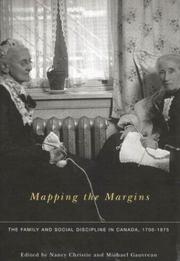
ISBN: 1282861794 9786612861796 077357185X 9780773571853 0773526986 9780773526983 077352729X 9780773527294 9781282861794 6612861797 Year: 2004 Publisher: Montreal ; Ithaca : McGill-Queen's University Press,
Abstract | Keywords | Export | Availability | Bookmark
 Loading...
Loading...Choose an application
- Reference Manager
- EndNote
- RefWorks (Direct export to RefWorks)
Contributors include Denyse Baillargeon (Université de Montréal), Bettina Bradbury (York University), Josette Brun (Université Laval), Nancy Christie (Hamilton), Gwendolyn Davies (University of New Brunswick), Michael Gauvreau (McMaster University), Peter Gossage (Université de Sherbrooke), Ollivier Hubert (Université de Montréal), Jack Little (Simon Fraser University), James Moran (University of Prince Edward Island), Suzanne Morton (McGill University), Matt Savelli (McMaster University), Michele Stairs (York University), James Struthers (Trent University), and David Wright (McMaster University).
Family --- Marginality, Social --- Exclusion, Social --- Marginal peoples --- Social exclusion --- Social marginality --- Assimilation (Sociology) --- Culture conflict --- Social isolation --- Sociology --- People with social disabilities --- Families --- Family life --- Family relationships --- Family structure --- Relationships, Family --- Structure, Family --- Social institutions --- Birth order --- Domestic relations --- Home --- Households --- Kinship --- Marriage --- Matriarchy --- Parenthood --- Patriarchy --- History. --- Social aspects --- Social conditions --- Famille --- Marginalit --- Histoire. --- Marginalite
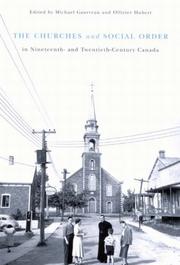
ISBN: 1282866478 9786612866470 0773576002 9780773576001 9780773530577 0773530576 0773530983 9780773530980 9781282866478 6612866470 0773581987 Year: 2006 Volume: 45 Publisher: Montréal Ithaca McGill-Queen's University Press
Abstract | Keywords | Export | Availability | Bookmark
 Loading...
Loading...Choose an application
- Reference Manager
- EndNote
- RefWorks (Direct export to RefWorks)
By examinng education, charity, community discipline, the relationship between clergy and congregations, and working-class religion, the contributors shift the field of religious history into the realm of the socio-cultural. This novel perspective reveals that the Christian churches remained dynamic and popular in English and French Canada, as well as among immigrants, well into the twentieth century.
Christian sociology --- Christian social theory --- Social theory, Christian --- Sociology, Christian --- Sociology --- History --- Canada --- Canada (Province) --- Canadae --- Ceanada --- Chanada --- Chanadey --- Dominio del Canadá --- Dominion of Canada --- Jianada --- Kʻaenada --- Kanada (Dominion) --- Ḳanadah --- Kanadaja --- Kanadas --- Ḳanade --- Kanado --- Kanakā --- Province of Canada --- Republica de Canadá --- Yn Chanadey --- Καναδάς --- Канада --- קאנאדע --- קנדה --- كندا --- کانادا --- カナダ --- 加拿大 --- 캐나다 --- Lower Canada --- Upper Canada --- Church history --- Sociologie religieuse --- Christianisme --- Histoire --- Histoire religieuse --- Kaineḍā
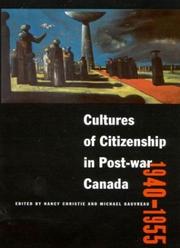
ISBN: 1282861476 9786612861475 0773571442 9780773571440 9780773526082 0773526080 Year: 2003 Publisher: Montréal Montreal, Que. McGill-Queen's University Press
Abstract | Keywords | Export | Availability | Bookmark
 Loading...
Loading...Choose an application
- Reference Manager
- EndNote
- RefWorks (Direct export to RefWorks)
The years between the end of World War II and the mid-1960s have usually been viewed as an era of political and social consensus made possible by widely diffused prosperity, creeping Americanization and fears of radical subversion, and a dominant culture challenged periodically by the claims of marginal groups. By exploring what were actually the mainstream ideologies and cultural practices of the period, the authors argue that the postwar consensus was itself a precarious cultural ideal that was characterized by internal tensions and, while containing elements of conservatism, reflected considerable diversity in the way in which citizenship identities were defined. Contributors include Denyse Baillargeon (Université de Montréal), P.E. Bryden (Mount Allison University), Nancy Christie, Michael Gauvreau, Karine Hebert (Carleton University), Len Kuffert (Carleton University), and Peter S. McInnis (St Francis Xavier University).
Families --- Family --- Family life --- Family relationships --- Family structure --- Relationships, Family --- Structure, Family --- Social institutions --- Birth order --- Domestic relations --- Home --- Households --- Kinship --- Marriage --- Matriarchy --- Parenthood --- Patriarchy --- History. --- Historiography. --- Social aspects --- Social conditions --- Canada --- History --- Histoire
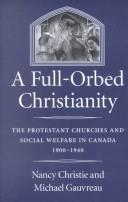
ISBN: 1282853872 9786612853876 0773565949 9780773565944 0773513973 9780773513976 0773522409 9780773522404 9781282853874 6612853875 Year: 1996 Publisher: Montreal, Qué. McGill-Queen's University Press
Abstract | Keywords | Export | Availability | Bookmark
 Loading...
Loading...Choose an application
- Reference Manager
- EndNote
- RefWorks (Direct export to RefWorks)
Christie and Gauvreau look at the ways in which reformers expanded the churches' popular base through mass revivalism, established social work and sociology in Canadian universities and church colleges, and aggressively sought to take a leadership role in social reform by incorporating independent reform organizations into the church-sponsored Social Service Council of Canada. They also explore the instrumental role of Protestant clergymen in formulating social legislation and transforming the scope and responsibilities of the modern state. The enormous influence of the Protestant churches before World War II can no longer be ignored, nor can the view that the churches were accomplices in their own secularization be justified. A Full-Orbed Christianity calls on historians to rethink the role of Protestantism in Canadian life and to see it not as the garrison of anti-modernity but as the chief harbinger of cultural change before 1940.
Church and social problems --- Protestant churches --- Christian sociology --- Christian social theory --- Social theory, Christian --- Sociology, Christian --- Sociology --- Protestant sects --- Christian sects --- Protestantism --- Christianity and social problems --- Social problems and Christianity --- Social problems and the church --- Social problems --- History. --- Canada --- Canada (Province) --- Canadae --- Ceanada --- Chanada --- Chanadey --- Dominio del Canadá --- Dominion of Canada --- Jianada --- Kʻaenada --- Kanada (Dominion) --- Ḳanadah --- Kanadaja --- Kanadas --- Ḳanade --- Kanado --- Kanakā --- Province of Canada --- Republica de Canadá --- Yn Chanadey --- Καναδάς --- Канада --- קאנאדע --- קנדה --- كندا --- کانادا --- カナダ --- 加拿大 --- 캐나다 --- Lower Canada --- Upper Canada --- Social conditions --- Kaineḍā
Book
ISBN: 1442660007 9781442660007 9780802086327 9780802089496 0802089496 0802086322 1442660015 Year: 2018 Publisher: Toronto : University of Toronto Press,
Abstract | Keywords | Export | Availability | Bookmark
 Loading...
Loading...Choose an application
- Reference Manager
- EndNote
- RefWorks (Direct export to RefWorks)
By shifting their focus beyond the internal dynamics of institutions, Nancy Christie and Michael Gauvreau address broad social issues such as the ways in which religion is linked to changing mores, the key role of laypeople in shaping churches, and the ways in which First Nations peoples both appropriated and resisted missionary teachings. With an important analysis of popular religious ideas and practices, Christian Churches and Their Peoples demonstrates that the cultural authority and regulatory practices of religious institutions both affirmed and opposed the personal religious values of Canadians, ultimately facilitating their elaboration of personal, ethnic, gender, and national identities."--Pub. desc. "Religious institutions, values, and identities are fundamental to understanding the lived experiences of Canadians in the nineteenth- and early twentieth-century. Christian Churches and Their Peoples, an inter-denominational study, considers how Christian churches influenced the social and cultural development of Canadian society across regional and linguistic lines.
Canada --- Canada (Province) --- Canadae --- Ceanada --- Chanada --- Chanadey --- Dominio del Canadá --- Dominion of Canada --- Jianada --- Kʻaenada --- Kanada (Dominion) --- Ḳanadah --- Kanadaja --- Kanadas --- Ḳanade --- Kanado --- Kanakā --- Province of Canada --- Republica de Canadá --- Yn Chanadey --- Καναδάς --- Канада --- קאנאדע --- קנדה --- كندا --- کانادا --- カナダ --- 加拿大 --- 캐나다 --- Lower Canada --- Upper Canada --- Church history. --- Religious life and customs. --- Religion. --- Kaineḍā --- HISTORY --- RELIGION --- General. --- Christianity --- History. --- Religion, Primitive --- Atheism --- Irreligion --- Religions --- Theology
| Listing 1 - 10 of 13 | << page >> |
Sort by
|

 Search
Search Feedback
Feedback About UniCat
About UniCat  Help
Help News
News